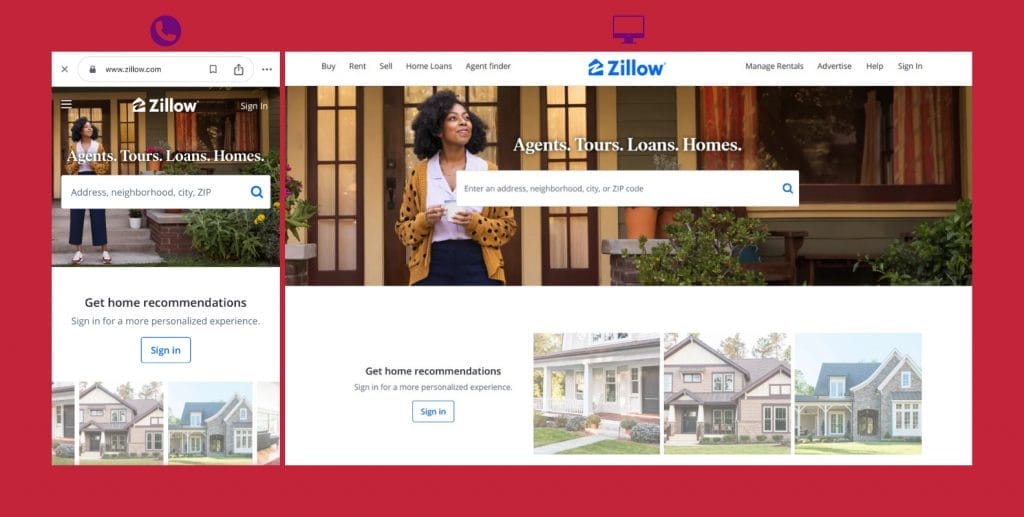The real estate industry is booming. In fact, the estimated revenue of the industry was over $500 billion in 2022 – and it is only set to rise. Given that most people now use the Internet for nearly everything, it is no wonder real estate professionals are looking for new online marketing strategies.
In this article, we’ll delve into crucial strategies that can form a successful online marketing campaign.
From harnessing the power of social media to advanced video marketing techniques, these tips are designed to elevate real estate professionals’ online presence. So, let’s get started!
The benefits of digital marketing for real estate
Digital marketing strategies unlock a host of benefits for real estate professionals, enhancing the reach, engagement, and overall effectiveness of their marketing efforts:
- Precise targeting: Utilize social media and search engines to reach specific demographics, such as location, age, income, and interests, ensuring your content is seen by the right audience.
- Measurable outcomes: Access to detailed analytics allows for tracking the success of campaigns in real time, helping to understand what attracts clicks, views, and, ultimately, leads.
- Cost-effectiveness: Digital marketing often requires a lower investment than traditional methods, but it can potentially yield a higher return on investment through targeted campaigns and organic reach.
- Broader reach: You can easily engage with a global audience or focus on a local market, breaking geographical barriers that traditional marketing can’t overcome.
- Enhanced engagement: Interactive content, such as virtual tours and online questionnaires, increases engagement, keeping potential clients interested and involved with your brand.
- Speed and flexibility: Quickly launch campaigns and adjust them on the fly based on performance data or changing market conditions, allowing for agile marketing strategies.
- Improved customer insights: Digital platforms offer valuable data on customer behavior, preferences, and feedback, enabling more personalized and effective marketing strategies.
Real estate digital marketing strategies
1. Conduct a market analysis
Start by identifying your target audience – knowing who you’re trying to reach is half the battle. Are they first-time homebuyers, luxury property investors, or perhaps families looking to upgrade? This insight shapes your strategy.
Besides this research, make sure to always listen to your customers. Surveys, feedback forms, and social media can provide valuable insights into what buyers and sellers value most. This direct input helps tailor your services and marketing messages to meet real needs, ensuring your offerings resonate deeply with your target audience.
Then, you can examine current trends in the real estate sector, such as pricing, demand, and customer preferences. This could mean looking into how remote work has influenced homebuying priorities or which areas are seeing an uptick in sales.
Finally, pay special attention to your local competitors. What strategies are they employing? How do they market their properties? Identifying gaps in their approach can reveal opportunities for you to stand out. For example, if most competitors focus heavily on traditional advertising, there might be a chance for you to capture attention through innovative online content.
2. Build a user-friendly website
Creating a dedicated, user-friendly website is essential for any successful real estate business. An easy-to-navigate website is a powerful tool for showcasing your ability to understand and meet your clients’ needs.
To enhance your website, consider incorporating key elements that elevate the user experience:
- Feature testimonials from previous clients on your site. These work as social proof, providing real-world evidence of your reliability and expertise.
- Use high-quality photography optimized for the web, as these will capture the attention of potential clients and show your professionalism.
- Create a compelling agent or business biography page to establish a personal connection with visitors.
- Offer downloadable resources such as eBooks and educational courses, showing that you are an authoritative figure in the real estate market.
- Prioritize responsive design to make sure your website functions across various devices, from desktops to mobiles. For example, Zillow offers a perfect response from both desktop and mobile:
- Implement basic SEO strategies, including keyword research and internal linking techniques, to improve your website’s visibility on search engines and attract a wider audience.
- Consider running your website on WordPress. By using plugins like WebinarPress, you can integrate webinars directly into your WordPress site. This enhances the overall value of your website and plays a crucial role in boosting SEO rankings and expanding your online visibility and reach.
Investing in a user-friendly website enriched with valuable content and optimized for search engines is a great step to thriving within the competitive real estate market. With these strategies, you can build your online presence and establish trust, credibility, and lasting connections with your clients.
3. Offer virtual tours and digital open houses
Virtual tours and open houses are new ways to showcase your properties. Virtual tours, especially those created with products like Matterport, offer 3D renderings that allow users to walk through homes virtually. This immersive technology allows potential buyers to explore properties from the comfort of their own homes.
For those using WordPress, plugins can integrate Matterport or similar renderings into their websites. This will enhance the user experience and show technological proficiency to potential clients.
Virtual tours and digital open houses create an engaging experience and add value to potential clients by offering a convenient and immersive way to explore properties, saving time and effort.
Moreover, they attract serious buyers who have already engaged with a property virtually, making them more likely to convert. This is an exceptional tactic to stand out.
🏠 Bonus tip: WebinarPress can be a valuable asset for hosting virtual open houses. This tool extends the reach of property sales beyond local boundaries, connecting with potential buyers from all over the world.
4. Try out other video marketing techniques
Video marketing is a powerful tool to showcase properties and share valuable content.
As we mentioned, you can start by creating virtual tours of your listings. These videos can be shared on social media platforms, your website, and even in email campaigns, allowing potential clients to explore homes from the comfort of their own homes.
However, don’t limit yourself to just tours: Consider producing educational content, such as home-buying tips or market analyses, to establish your authority in the real estate sector.
Another great way to establish your online presence is to host educational webinars and live Q&A sessions. You could create content for fellow real estate professionals or first-time home buyers. The opportunities are endless! Base your content ideas on your target audience and goal, and you can’t go wrong. Additionally, you can use these webinars to capture leads and move potential buyers further down the sales funnel.
Other content types for real estate include:
- High-quality property images: Essential for catching the eye of potential buyers and showcasing the features of your listings across platforms like Instagram and Pinterest.
- Market insights and articles: Demonstrating your knowledge of the real estate market through well-researched articles and posts on LinkedIn or your blog can establish your authority in the field.
- Customer testimonials: Sharing success stories and reviews from satisfied clients builds trust. These can be featured on your website, emails, and social media platforms.
- Email newsletters: Use email to share exclusive property listings, market updates, and personalized content tailored to the interests of your subscriber list, keeping them engaged and informed.
- Interactive content: Quizzes, polls, or calculators (e.g., mortgage calculators) on your website or social media can engage users and provide valuable tools for their real estate decisions.
5. Create an engaging social media presence
Building an engaging social media presence is a game-changer for real estate professionals. Platforms like Facebook, Instagram, and LinkedIn offer a vast audience where you can connect with potential buyers and sellers.
LinkedIn, in particular, goes beyond client connections. It’s a goldmine for building relationships with the professionals you need to run your business, such as contractors, house inspectors, and mortgage brokers.
Investing effort into your social media presence is important, which means that you shouldn’t just post listing after listing. Instead, focus on creating genuine connections within your network.
One of the best ways to do that is responding to comments. Constructive engagement builds trust, even in the face of criticism. However, it’s wise to avoid attacking negative comments. Remember, no reply is better than a bad one.
💡Tip: Consider using social media management tools like Hootsuite or Sprout Social to schedule your posts, ensuring consistency and effectiveness.
Lastly, tailor your social media strategy to match your brand and target audience. For instance, if you’re a residential agent targeting millennial first-time buyers, incorporating memes can add a relatable and fun aspect to your content. On the other hand, a commercial real estate agent targeting luxury corporate brands might opt for a more sophisticated and professional approach.
Overall, a thoughtfully crafted social media presence expands your reach and humanizes your brand, making you more approachable and relatable.
6. Connect with your audience through email marketing
Investing in email marketing is an excellent strategy for real estate agents, offering a direct and effective means of connecting with their audience. Research from Campaign Monitor in 2022 showed that the average open rate for real estate emails was 17.2%, with a click-through rate of 3.6%. This data shows the immense potential for agents who invest time and effort into building a mailing list and crafting compelling email campaigns.
To build an effective mailing list:
- Collect email addresses at events and meetings: Networking opportunities are goldmines for gathering contact information. Engage with attendees and exchange details to expand your email list.
- Create a landing page promoting your mailing list: Establish an online presence for your mailing list by creating a dedicated landing page. Promote this page across all your social media accounts to attract subscribers.
- Collect contact information during webinars or eBook downloads: Capture leads during webinars or when users download eBooks. This ensures that you’re connecting with individuals interested in your expertise.
Types of emails agents might send include:
- Newsletters: Share local real estate news, tips, and tricks to provide value to your audience.
- Promotional materials: Show local homes for sale, tailoring your content to meet the specific needs and preferences of your recipients.
- Marketing campaigns, reminders, and follow-ups: Stay engaged with your audience by sending reminders and follow-ups for live and virtual events, such as open houses, seminars, and webinars.
🏠 Bonus tips:
- Integrate WebinarPress with popular mailing platforms and simplify the process of incorporating it into your mailing list strategy.
- Monitoring your email address for replies is crucial. Actively connect with individuals who reach out, creating meaningful interactions. Don’t underestimate the value of this marketing channel, or let potential leads pass by.
- Personalize emails. Send tailored property suggestions, market updates, and exclusive offers directly to your audience. Personalization techniques, such as using the recipient’s name and tailoring content based on their preferences and behaviors, significantly increase open rates and engagement, building a more meaningful connection with potential clients.
7. Coordinate your efforts into a deliberate marketing plan
Creating a successful marketing plan means aligning your actions with your overall business goals.
Set clear, measurable objectives for each campaign – whether increasing website traffic, generating leads, or boosting social media engagement. This way, you can track your progress and adjust your tactics as needed.
Finally, ensure all your marketing efforts are interconnected. Your blog posts can fuel your email newsletters, and your social media can drive traffic to your virtual tours. By coordinating your actions, every piece of content and every post serves a purpose, moving you closer to your goals in a cohesive, strategic manner.
🏠 Bonus tip: Plan your real estate marketing budget very carefully. You might be tempted to try everything we listed today, but it’s important to prioritize and decide which strategy or combination would work best with your business goals and financial situation.
8. Embrace marketing automation
Marketing automation refers to software that automates your marketing actions. It can save you time and increase efficiency by sending out scheduled emails, posting on social media, and updating your website with the latest listings.
Tools like CRM systems help in tracking client interactions, ensuring timely follow-ups, and personalizing communication. By automating routine tasks, you can focus more on closing deals and less on the nitty-gritty of marketing. Here are some useful tools you can try:
- Mailchimp: An email marketing platform that can automate your newsletter and property alerts, ensuring potential clients receive timely updates on listings that match their interests.
- HubSpot: A comprehensive CRM and marketing suite that automates lead tracking, email campaigns, and content management, helping real estate professionals nurture leads through personalized engagement.
- Zapier: An integration tool that connects your favorite apps and services, automating workflows like adding new leads to your CRM or sending a follow-up email after a client inquiry.
9. Take advantage of paid advertising and retargeting
Paid advertising, through platforms such as Google Ads and Facebook Ads, allows you to place your listings directly in front of your target audience. Use these ads to highlight your standout properties or services.
Retargeting, on the other hand, is a technique for re-engaging individuals who’ve visited your website but have yet to take action. By strategically placing your ads on other sites they visit, you gently remind them of their interest in your offerings, increasing their likelihood of returning.
Channels suitable for real estate marketing
You need to go where your audience is and adapt the content type accordingly. Here are some ideas.
- Instagram: Best for showcasing high-quality images and videos of properties, behind-the-scenes tours, and webinars with live Q&A sessions. Its visual nature makes it perfect for capturing the aesthetic appeal of your listings.
- Pinterest: Ideal for sharing photos of home decor, landscaping ideas, and dream homes. It’s a go-to platform for users seeking inspiration for home buying and renovation projects, making it a great place to attract potential buyers.
- LinkedIn: A professional network that’s excellent for building relationships with other real estate professionals, sharing industry insights, and publishing articles on market trends. Use it to establish your expertise and credibility in the real estate sector.
- Facebook: With its diverse user base, Facebook allows for targeted advertising, sharing comprehensive property listings, hosting virtual open houses, and creating dedicated pages for your real estate business.
- YouTube: The leading platform for video content, YouTube is ideal for posting property tours, client testimonials, and educational content on the buying and selling process, offering a rich medium to engage with clients.
- Twitter: Useful for sharing quick updates, news on the real estate market, and engaging directly with clients through conversations. Its fast-paced nature makes it suitable for timely communication.
- Real estate blogs: Hosting a blog on your website can improve SEO and drive traffic, providing a space to share in-depth articles on home buying tips, market analysis, and success stories.
Real estate reputation management
Your online reputation can make or break your real estate business. Actively request reviews from satisfied clients and respond professionally to any negative feedback. Showcase positive testimonials on your website and social media. Monitoring your online presence and ensuring a positive perception can enhance trust and attract more clients.
WebinarPress: Your real estate marketing game changer
Incorporating digital marketing strategies and using WebinarPress can elevate your real estate business. These tips have the potential to expand your client base, enhance your reputation, and generate additional revenue streams.
Don’t miss out on transforming your real estate marketing strategy. Download the WebinarPress plugin now to become a leading real estate business!





